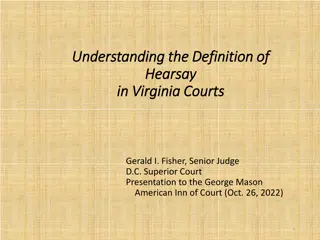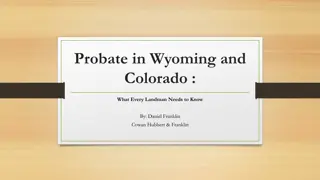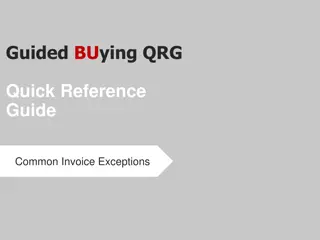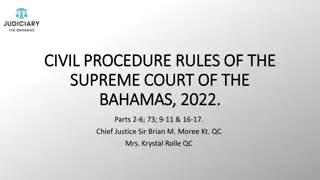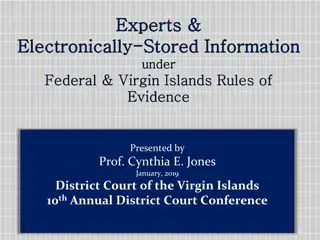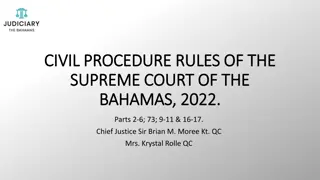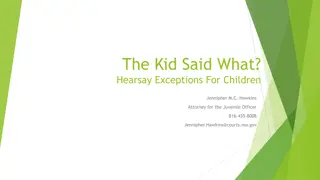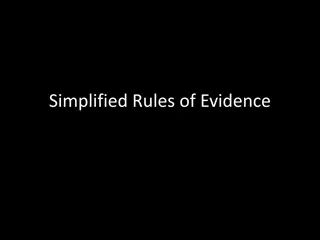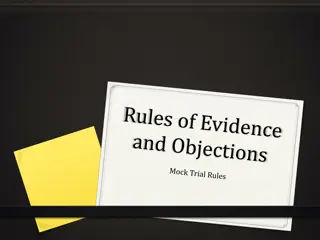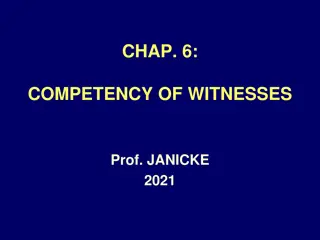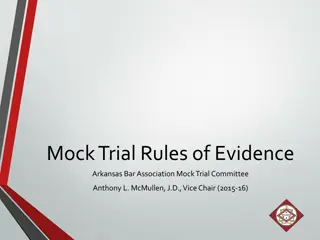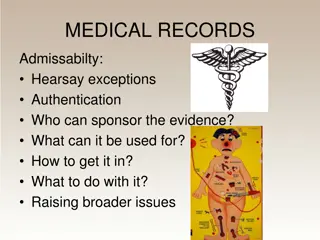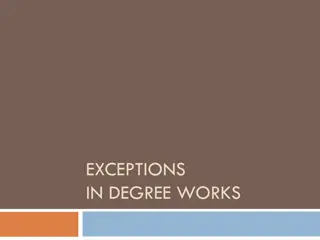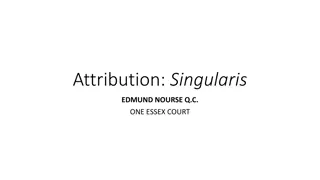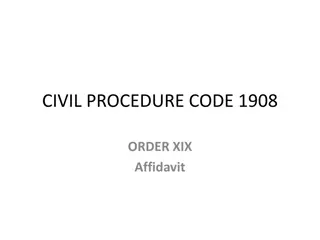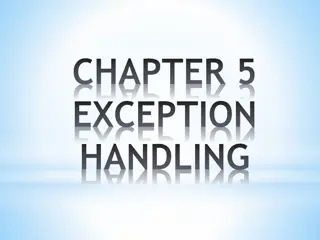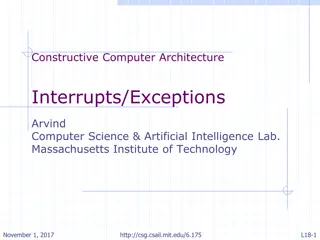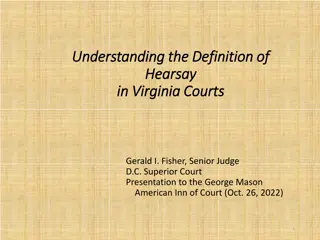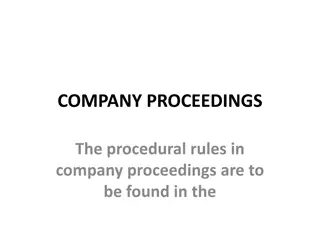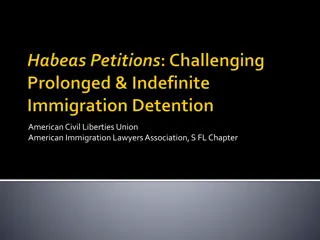Understanding Hearsay Rules and Exceptions in Legal Proceedings
Hearsay evidence, which is an out-of-court statement introduced for the truth of its content, is considered less reliable in court due to factors like lack of oath, inability to see demeanour of declarant, and absence of cross-examination. Various historical judgments and legal exceptions allow certain hearsay statements to be admitted based on trustworthiness. Personal knowledge, relevance, procedural compliance, exclusion criteria, and exceptions influence the admissibility of hearsay evidence. Meeting an exception doesn't guarantee automatic admissibility; considerations like relevance and probative value are crucial. When a statement meets an exception and is admissible, it can be considered as substantive evidence by the factfinder.
Download Presentation

Please find below an Image/Link to download the presentation.
The content on the website is provided AS IS for your information and personal use only. It may not be sold, licensed, or shared on other websites without obtaining consent from the author. Download presentation by click this link. If you encounter any issues during the download, it is possible that the publisher has removed the file from their server.
E N D
Presentation Transcript
Judge Gerald I. Fisher NCPJ Spring Conference New Orleans, LA May 16, 2019 1
Hearsay an out truth of what is asserted in the statement law to be less reliable because: of- -court statement being introduced for the truth of what is asserted in the statement is deemed by the an out- -of court statement being introduced for the not under oath cannot see demeanor of declarant at time of statement cannot cross-examine declarant Generally these factors are designed to test the declarant s memory, sincerity and credibility or the trustworthiness of the statement. 2
are based on historical judgments that some statements are sufficiently trustworthy that the jury should be allowed to consider them. The common law and FRE exceptions to hearsay generally FRE codify 28 exceptions under Rules 803, 804, and 807, most of which, but not all, were recognized by the common law. Before reviewing the exceptions there are some general principles to remember: 3
Preliminary Notes Preliminary Notes 1. There must be a demonstration of personal knowledge two levels: personal knowledge at a. The witness testifying to the hearsay statement must have heard or read the hearsay statement personally. b. The declarant must make the statement based upon personal knowledge. 2. In making a determination of personal knowledge, the declarant s statements concerning personal knowledge are accepted as true for all the exceptions, except business records (FRE 803(6)), public records (FRE 803(8)), declarations against penal interest (FRE 804(b)(3)), and the catchall (FRE 807). 4
3. Merely because evidence fits within an exception to the hearsay rules does not mean that it is automatically admissible. You must also ask: a. Is it relevant? b. Have procedures for examining witnesses been complied with (FRE 611-14)? c. Is it otherwise excluded as a matter of substance (FRE 404-12)? d. Is it excluded because its unfair prejudice substantially outweighs its probative value (FRE 403)? 5
4. If a statement meets an exception, this means (a) it is an assertion, and (b) the statement is offered for the truth of the matter asserted. In other words, the statement is hearsay but meets an exception. If the statement meets an exception, and it is otherwise admissible, the factfinder (judge/jury) can consider it as substantive evidence. 6
Hypothetical #1 Hypothetical #1 In an heirship proceeding regarding an intestate estate, Oldest Son takes the stand and begins his testimony by stating, I am the oldest son of Decedent, at which point counsel for one of the other potential heirs loudly objects, I object. This is rank hearsay! In response, counsel for Oldest Son (rolling her eyes in exasperation) responds: If that s hearsay, opposing counsel is the Queen of Sheba. 7
Is the statement I am the oldest son of Decedent: 1. Admissible (not hearsay) 2. Inadmissible (hearsay) 3. Admissible in part 8
100% 80% 60% 40% 20% 0% 0% 0% 0% Admissible (not hearsay) Inadmissible (hearsay) Admissible in part 9
Categories of Hearsay Exceptions Categories of Hearsay Exceptions Where the hearsay statement is admissible only upon a showing that declarant is unavailable 804. unavailable to testify See FRE Where the declarant s availability to testify is immaterial See FRE 803. availability to testify is immaterial 10
Unavailability Defined: 1. Privilege, FRE 804(a)(1). 2. Contemptuous refusal, FRE 804(a)(2). 3. Lack of memory as to the subject matter, FRE 804(a)(3). 4. Death or infirmity, FRE 804(a)(4). 11
5. Absence from hearing and proponent has been unable to procure witness attendance, FRE 804(a)(5). If the proponent is seeking to introduce a dying declaration of personal or family history show more than simply that the witness failed to respond to a properly served subpoena. dying statement declaration, statement against interest of personal or family history, the proponent must statement against interest, or statement 12
1. Former Testimony, show: Testimony (under oath) at another trial, hearing or deposition; The party had an opportunity to examine the witness at the earlier proceeding; and There was a similar motive to question the witness; In a criminal case is being offered must have been a party in the earlier proceeding; and In a civil case predecessor in interest. 1. Former Testimony, FRE 804(b)(1) Proponent must criminal case, the party against whom the testimony civil case, it must be the same party or that party s 13
2. Dying Declarations, statement: 2. Dying Declarations, FRE 804(b)(2) Elements are: is offered in a homicide or civil case; was made while declarant believed death was imminent; and concerns the cause or circumstances of what the declarant believed to be impending death. Note: Note: Not limited to dead declarants 14
3. Declarations Against Interest penal), FRE 804(b)(3): 3. Declarations Against Interest (pecuniary, proprietary, Reasonable person would not have made the statement unless it was true because it was contrary to declarant s pecuniary or proprietary interest or so contrary to or had so great a tendency to subject declarant to civil or criminal liability. Declarant must be aware statement is against interest at the time of its making. If statement against penal interest is offered in a criminal case, must demonstrate corroborating circumstances that clearly indicate its trustworthiness. 15
Hypothetical #2 Hypothetical #2 Creditor sues the PR for payment of a promissory note Decedent had entered into and which became due five years before his estate was opened. PR asserts a defense of the three-year statute of limitations. Creditor is prepared to testify that when the note became due, Decedent acknowledged he owed the money and, in exchange for creditor s agreement not to foreclose on the loan, orally extended the due date to fall within one year of the date he died, thereby avoiding the statute of limitations. PR objects on hearsay grounds. 16
Is the Decedents oral agreement to extend the due date to fall within one year of his date of death admissible? 1. Admissible 2. Inadmissible 3. Admissible in part 17
100% 80% 60% 40% 20% 0% 0% 0% 0% Admissible Inadmissible Admissible in part 18
4. Statements of Personal or Family History, 804(b)(4): 4. Statements of Personal or Family History, FRE Statements about one s own personal or family history, or the personal or family history of another if the declarant is closely related or intimately related to that person/family. Implicit recognition that declarant has no means of obtaining personal knowledge Statements need not be ante litem motam - made before the controversy giving rise to the litigation. Exception overlaps with FRE 803(19) Reputation Concerning Personal or Family History 19
Hypothetical #3 Hypothetical #3 Decedent died without a will and had no wife or any direct relatives. At trial, a supposed first cousin (Smith) offers an affidavit by Decedent s Aunt that states that Decedent referred to Smith as his closest relative and first cousin. A second cousin (Doe), who will inherit part of the estate if Smith is not a first cousin, objects to the contents of the affidavit as being hearsay. 20
Is the statement in the affidavit by Decedents Aunt Admissible? 1. Admissible 2. Inadmissible 3. Admissible in part 21
100% 80% 60% 40% 20% 0% 0% 0% 0% Admissible Inadmissible Admissible in part 22
5. 5. Statement Offered Against a Party That Wrongfully Caused the Statement Offered Against a Party That Wrongfully Caused the Declarant s Declarant s Unavailability, Unavailability, FRE 804(b)(6): Must show that the party against whom the evidence is offered intended to . . . procure the unavailability of the declarant as a witness. See Giles v. California, 554 U.S. 353 (2008) (must be for purpose of preventing witness from testifying at current trial) Any relevant hearsay statement may be introduced if the showing required by the rule is made. 23
Hypothetical #4 Hypothetical #4 dividing her estate equally between her two sons. Son #1 is charged with the murder, but he still seeks a share of Mother s estate. Son #2 contends that Mother changed her will to disinherit Son #1 and Son #1 murdered her and destroyed the new will. At the estate trial, which proceeds before Son #1 s criminal trial, Son #2 wishes to present Aunt (Mother s sister) as a witness to testify that a few days before Mother s death, Mother told her that she disinherited Son #1. Decedent Mother was murdered, leaving a will responds, The statement is admissible under the forfeiture by wrongdoing exception to the bar against hearsay. Counsel for Son #1 objects. Counsel for Son #2 24
Is Aunts testimony that a few days before Mothers death, Mother told her that she disinherited Son #1 admissible? 1. Admissible 2. Inadmissible 3. Admissible in part 25
100% 80% 60% 40% 20% 0% 0% 0% 0% Admissible Inadmissible Admissible in part 26
1. Present Sense Impression: describing or explaining an event or condition, (c) made while the declarant was perceiving the event or condition, or immediately thereafter, FRE 803(1). 1. Present Sense Impression: (a) a statement (b) 27
2. Excited Utterance, 2. Excited Utterance, FRE 803(2): Proponent must show: Startling event; Statement made while declarant still under the stress of excitement does not have to be contemporaneous with the event that caused the stress; Statement relates to the event; and Based on personal knowledge. 28
The fact that declarant made the statement in response to a question does not necessarily preclude the statement from being an excited utterance. The critical factor is whether circumstances reasonably justify the conclusion that the remarks were spontaneous and not made under the impetus of reflection. 29
Hypothetical #5 Hypothetical #5 accident in which Decedent, a pedestrian, was struck by another (blue) car and died. Estate seeks to have Police Officer testify about a statement a visibly upset woman made to him as he arrived on the scene five minutes after the accident: Oh, my God, I just saw that red car (other evidence shows the red car was driven by Defendant Driver) run the red light and the blue car swerved to avoid it and struck the woman in the cross-walk! Counsel for Defendant Driver objects on hearsay grounds, noting the lack of a demonstration of unavailability, firsthand knowledge, and the witness identity, and the passage of time between the event and the statement. Counsel for the Estate responds that firsthand knowledge has been shown, that no further showings need be made, and that the statement is admissible as both an excited utterance and a present sense impression. Estate sues Defendant Driver for causing an 30
Is the statement by the upset woman admissible as both an excited utterance and a present sense impression? 1. Admissible 2. Inadmissible 3. Admissible in part 31
100% 80% 60% 40% 20% 0% 0% 0% 0% Admissible Inadmissible Admissible in part 32
3. 3. Then A statement of the declarant s then-existing state of mind (such as motive, intent, or plan) or emotional, sensory, or physical condition (such as mental feeling, pain, or bodily health), but not including a statement of memory or belief to prove the fact remembered or believed unless it relates to the validity or terms of the declarant s will. Then- -Existing Mental, Emotional, or Physical Condition Existing Mental, Emotional, or Physical Condition, 33
Direct Statement of State of Mind Direct Statement of State of Mind E.g., decedent s statement, I don t like my son. This is to be distinguished from non-hearsay state-of- mind evidence, which is not admitted for its truth, but as circumstantial evidence of the declarant s state of mind e.g., decedent s statement, My son never comes by to see me, used to show decedent had less affection for son. The declarant s state of mind must be a relevant issue. Relevant states of mind may include intention, motive, belief, affection, malice or fear. 34
Present State of Mind To Do a Future Act Present State of Mind To Do a Future Act Another type of statement admissible under the state- of-mind exception conveys the intent of the declarant to perform an act in the future, where there is an issue as to whether in fact the act was performed. Mutual Life Insurance Co. v. Hillmon, 145 U.S. 285 (1892). Statements of memory (backward-looking) or of belief do not fall within the exception. Shepard v. U.S., 290 U.S. 96 (1933). Such statements may only be offered to prove that the declarant did a particular act, and cannot be introduced to prove that a third person did an act. U.S. v. Pheaster, 544 F.2d 353 (9th Cir. 1976). 35
Statement of Physical Condition Statement of Physical Condition Statements of the declarant s present bodily condition and related feelings; Limited to descriptions of current conditions or feelings; Can be made to anyone. 36
Statement Regarding Wills Statement Regarding Wills This is essentially an exception to Rule 803(3) s prohibition regarding statements of memory or belief, and permits such statements most often from the supposed testator when they relate to the validity or terms of a will. See, e.g., Primerica Life Ins. Co. v. Watson, 207 S.W.3d 443, 447-48 (Ark. 2004) (statement of decedent regarding his belief that he had changed the beneficiary of his life insurance policy from his ex-wife to his new wife admissible under FRE 803(3) where state law equates designation of beneficiaries to terms of a will) Arguably, this exception should apply to will substitutes, such as trusts and designation of property passing outside the will at the time of death. 37
Hypothetical #6 Hypothetical #6 to have Aunt testify to the following: A month before Mother s death, Mother told her that (i) she was very afraid of Son #1; (ii) that Son #1 had threatened to kill her; and (iii) that she was going to disinherit Son #1. As a result of this conversation, Aunt went to Son #2 and (iv) told him she was very afraid for Mother s safety. Same facts as Hypothetical #4. Son #2 also wishes responds, The statements are all admissible under the state of mind exception to the bar against hearsay. Counsel for Son #1 objects. Counsel for Son #2 38
Are the Aunts statements all admissible under the state of mind exception to the bar against hearsay? 1. Admissible 2. Inadmissible 3. Admissible in part 39
100% 80% 60% 40% 20% 0% 0% 0% 0% Admissible Inadmissible Admissible in part 40
Hypothetical #7 Hypothetical #7 In a probate proceeding, there is a dispute as to whether an expensive necklace is part of the estate and inherited by Decedent s daughter or was gifted to a niece. The niece seeks to call her mother (Decedent s sister) as witness to testify as to the below statements made by Decedent. The attorney for Decedent s daughter s objects to each of the statements on hearsay grounds. I am going to give my favorite necklace to my niece. 41
Is the Decedents statement as offered by her sister, I am going to give my favorite necklace to my niece, admissible? 1. Admissible 2. Inadmissible 3. Admissible in part 42
100% 80% 60% 40% 20% 0% 0% 0% 0% Admissible Inadmissible Admissible in part 43
Hypothetical #8 Hypothetical #8 Same facts. Decedent says to her sister/niece s mother: I gave my necklace to my niece, as I said I would. 44
Is the Decedents statement as offered by her sister, I gave my necklace to my niece, as I said I would, admissible? 1. Admissible 2. Inadmissible 3. Admissible in part 45
100% 80% 60% 40% 20% 0% 0% 0% 0% Admissible Inadmissible Admissible in part 46
Hypothetical #9 Hypothetical #9 Same facts. Decedent says to her sister/niece s mother: I love my niece and I love my daughter but I do not like my daughter because of how she behaves. 47
Is the Decedents statement as offered by her sister, I love my niece and I love my daughter but I do not like my daughter because of how she behaves, admissible? 1. Admissible 2. Inadmissible 3. Admissible in part 48
100% 80% 60% 40% 20% 0% 0% 0% 0% Admissible Inadmissible Admissible in part 49
Hypothetical #10 Hypothetical #10 Same facts. Decedent says to her sister/niece s mother: My daughter is very disrespectful to me. (1) Admissible? (2) Inadmissible? (3) Admissible in part? 50

 undefined
undefined








